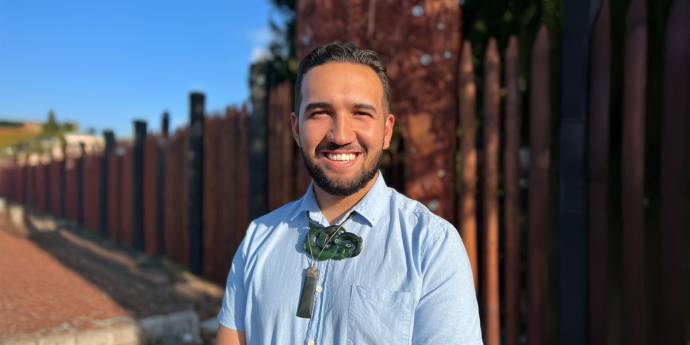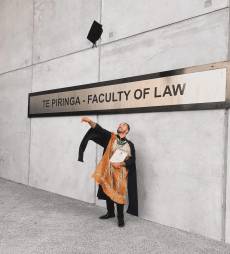Rodney Wong’s Success – finding points of light
Digging deep allows for positive change to take place at the board table, according to Palmerston North director Rodney Wong. Find out more.

Ambitious, kind, and focused on people. That’s the way Rotorua man, Te Rika Temara-Benfell (Ngāi Tūhoe, Ngāti Awa, Ngāti Manawa, Ngāti Pikiao, Waikato-Tainui, Ngāti Mahuta), describes himself.
Recently presented with the Institute of Directors (IoD) ‘Aspiring Māori Director Award’ which supports emerging Māori leaders on a path towards professional governance in Aotearoa New Zealand, Temara-Benfell grew up on his marae, immersed in Te Ao Māori and two churches – Seventh Day Adventists and the Ringatū – a church founded in 1868 by Te Kooti Arikirangi te Turuki. It is values from this, as well as from tikanga, that were ingrained in him from a young age, reinforcing the path he is on today.
“Manaakitanga, kaitiakitanga: being intergenerationally focused, sustainable, and caring for our people and communities (as if they were our own family) – those values and principles have definitely played a massive part in who I am, my identity, and my love of leadership,” Temara-Benfell says.
Having strong role models both from his marae and his whanau have informed that, too. His father was in the police force for 18 years before recently retiring, and his mother had a lengthy career teaching Kohanga Reo. As a result, leadership has come naturally for the aspiring director, who says opportunities to be a leader have been there since high school and university. But his passion for governance comes from his roots – the marae.
“Becoming a trustee of my marae and my hapu has been one of the greatest privileges of my life: to be able to serve my people and whanau, and to see my Kaumatua as positive role models in leadership. That’s how I want to be as a leader… that means everything for me – to see our people and whanau in these spaces,” he says.
Headstrong, proud and determined, Temara-Benfell has a natural presence and ease when he speaks. Not surprising, given he comes from a family of orators, including esteemed orator Tā Pou Temara, and renowned composer of waiata, Te Makarini Temara. The gift to speak and be heard is a skill, too, that has no doubt derived from years of observing debate on the marae, a context where he learnt early on, that “you’re not always the most important voice in the room” and that decisions are made collectively.
Accountability is also at the forefront of any decision-making, and transparency is a given. As he speaks, it almost feels like his kuia and elders are looking over him, as a reminder to never forget their presence.
“On the marae, you're accountable for everything, and your stakeholders…they’re your family, so the accountability is higher. Whether you're young or old, your people will hold you to account…when you do well, and when you don't.”
This builds character and resilience as a continual reminder to stay grounded, according to the young director.
“But then, when we look at some of our traditional values of Manaaki Tanga and kaitiakitanga – I go on, and on about how important it is to have a kind heart for your people and community. And then, kaitiakitanga – thinking sustainably,” he says, of values that encompass a minimum of 50 to 100, or even up to 500 years into the future.
For iwi and hapu, this allows for a wide-reaching view on what sustainability looks like for whanau, people and the community. It is also what makes it unique and sets it apart from governance on traditional businesses, which might set their strategic vision anywhere between 10 or 20 years.
 Even at a young age, Temara-Benfell is already making an impact in his region and the wider community. Proud to be a small part of a movement of younger Māori voices increasingly coming through the ranks in all areas of New Zealand life and society, he acknowledges Te Pati Māori MP, Hana-Rawhiti Maipi-Clarke, and the Māori Queen, Ngā Wai hono i te pō – the eighth Māori monarch and youngest daughter of Kiingi Tuheitia Pōtatau Te Wherowhero VII, who was laid to rest in September. Temara-Benfell refers to women as inspirational leaders.
Even at a young age, Temara-Benfell is already making an impact in his region and the wider community. Proud to be a small part of a movement of younger Māori voices increasingly coming through the ranks in all areas of New Zealand life and society, he acknowledges Te Pati Māori MP, Hana-Rawhiti Maipi-Clarke, and the Māori Queen, Ngā Wai hono i te pō – the eighth Māori monarch and youngest daughter of Kiingi Tuheitia Pōtatau Te Wherowhero VII, who was laid to rest in September. Temara-Benfell refers to women as inspirational leaders.
He isn’t surprised to see younger voices given a platform. But equally, he’s aware that determination and courage is also needed to stay the course.
“When individuals are chosen by their marae or iwi as leaders, there is a saying, ‘Your whakapapa gets you to the table, but it’s your skill and character that keeps you there’.”
Temara-Benfell says this generation of rangitahi is unlike any earlier generation before them. This is, in part, due to access to information and resources. Importantly, he says it’s now visible to see the fruits of their grandparents’ and great grandparents’ labour, which has manifested in a “really resilient, bright, and remarkable generation”.
“These young people are staunch in their identity and proud of who they are; proud of the values that they have grown up with, and they can communicate and exercise those values in an unapologetic way, which I think is really, really powerful,” he says.
While his roots have been formed through Māori governance, Temara-Benfell has been transitioning to international charities and community sector boards. Still young, his list of board roles is already long, and include sitting on the Global Advisory Council (Spirit Project) - Lego Foundation; he is a board member and trustee of Toi Matarua (Indigenous Research Trust), a tribal delegate/representative for the Ruatāhuna-Manawarū Tribal Authority (Te Taraipara o Manawaru), and a trustee of his marae and hapū, just to name a few. Having recently completed his Master of Law in Māori and Indigenous Laws (2023), he is also Kaitohutohu Matua (Iwi Partnerships) at Te Puni Kōkiri.
As part of his Aspiring Māori Director Award, Temara-Benfell will have the opportunity to observe governance through a larger lens – a placement with Toi Kai Rawa – the Bay of Plenty’s Regional Māori Economic Development agency. Excited about the opportunity to continue developing new skills and gain valuable insights which he can take back to his other board roles – and to iwi, he says the organisation’s values align with his own, especially its long term, intergenerational vision, and purpose.
When asked whether he feels the weight of responsibility to represent his hapu or iwi – the lingering thought that sits at the forefront of his mind, “I'm very aware that I stand on the shoulders of giants.”
“I want our next generation to do the same…a path has been laid for us, and it would be remiss of us (rangatahi) not to chart that path and build it further for the next generation,” he says.
Forging his own path means investing his time and energy to change the story and build resilience for Māori, and he’s committed to supporting transformational systemic change.
“I was one of those children. Now I'm an adult and a governor in these leadership spaces, but what keeps me there is this sense of responsibility – that I have to leave our resources and our world in a better space for the next generation after me – just like my whanau did before me. It’s a round circle, everything is connected,” Temara-Benfell says.
Te Rika Temara-Benfell received his award on 4 December presented by the Bay of Plenty Branch of the Institute of Directors. This article featured in the New Zealand Herald.